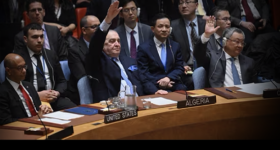Andrew McKillop
21st Century Wire
SUPER MARIO BOMBS

As of February 25, exit polls and analysts’ reviews of voter trends showed a total collapse in support for Mario Monti, called “Super Mario” for a while by government-friendly media.
The ‘technocrat’ parachuted in by Europe’s elite to apply a classic austerity programme as Italy’s Brussels-approved unelected Prime Minister from late 2011, scored around 7% to 9% of votes cast. He is finished.
Why he stood at all was itself a clear and stark example of elite lying. On Sept 26, 2012 Monti said in an interview on CNN during a trip to the United States:
“I will not run for the elections,” where he did stand, and got demolished. Italian voters above all rejected his austerity programme, his Brussels connection, and his Goldman links with The Masters of the Eurozone – the Elite Mafia destroying the economy.”
HIGH TIMES AND HIGH TIDE OF GS RULE
The ascension of Mario Monti to the Italian prime ministership was remarkable for so many reasons we have to be suspicious about how it happened: who pulled the strings? For the zombie media anxious to keep the public disinformed, Monti replaced scandal-surfing Silvio Berlusconi because Italy needed an unelected technocrat as prime minister. By putting a senior adviser at Goldman Sachs in charge of Italy, the real power of this investment bank and broker was revealed.
Late 2011 was surely the High Time for GS rule of the Eurozone. Monti was in charge of Italy.
The European Central Bank, a crucial player in the sovereign debt drama was and still is under ex-Goldman management, and GS still holds sway in the corridors of power across Europe. Until late 2011, the IMF’s European division was run by a Goldman Sachs man, Antonio Borges, who resigned “for personal reasons”. Goldman says it is there to provide advice and financing for governments, to send in its experts, and to move forward – creating such a deep exchange of people and ideas and money that it is impossible to tell the difference between the public interest and the Goldman Sachs interest. More specifically, Goldman Sachs has written over $2 trillion of insurance linked with and based on Eurozone country debt, and GS will not escape unscathed if some of the $2 trillion it has purchased was from (for example) an Italian bank that may go under. This is why Europe’s bailouts for Banksters and austerity for the people must go on – forever.
The threat wielded by GS is that “the only alternative” is a second Eurozone financial crisis, and a second wave of economic collapse across Europe. This week’s Italian elections threw out “the Vampire Squid”, the Wall Street nickname for GS and its high flying, always secretive manipulators and fixers. To be sure, the markets panicked at this terrible threat to Business as Usual!
ANGELA MERKEL IS WORRIED
Other Eurozone elites are uneasy. German Chancellor Angela Merkel made no secret of her disappointment at Not-so-Super Mario Monti’s debacle. She urged Rome to continue with “reforms”, the codeword for higher taxes, austerity and mass unemployment. Other Eurozone leaders, including senior ministers in France’s Parti Socialiste government – heavily engaged in its own austerity programme and “courageously” accepting France’s ever rising unemployment – said that a new and stable government in Italy, carrying out “reforms”, was vital to stabilizing the common currency.
Silvio Berlusconi is however not worried. He welcomes any kind of coalition government role – except with Monti and excluding all and any possible role for Monti. Thanks to his control of more than 90% of Italian media, Berlusconi was able to claw back votes and cut the lead of “the Eurozone favourite” Pier Luigi Bersani and his “reformed Communists” and New Democrats.
Berlusconi, showing his statesmanship has said he is prepared to make “sacrifices” for the country – meaning that he might work alongside a slightly left of centre parliamentary group, committed to “reforms” of course. Also in no way worried while making an excellent pretence of worry, financial market operators were lightning fast to profit from Italy’s electoral farce.
The premium Italy pays over Germany to borrow on 10-year loans widened to a yield a spread of 338.7 basis points, the highest since December. Monti’s magnificent work – impoverishing average Italians and increasing unemployment – was undone in a few hours: six-month Italian Treasury bills now need a yield of 1.237 percent, compared to just 0.730 percent at similar auctions a month ago.
Berlusconi was forced out of office and replaced by Monti in November 2011 as borrowing costs approached levels investors feared would become unsustainable. He said he was “not worried” about market reaction to the election and played down the significance of the spread. Above all he knew that Monti’s voter collapse showed that Monti’s centrist bloc and its elite “reforms” were the meat for populist electoral ploys, exploited by both Berlusconi and ex-comic Grillo and his 5-Star movement. The euro instantly lost several cents against the dollar – the subject of the euro’s overvaluation being a nearly endless theme of Eurozone elites – but caused by Monti being slayed at the Italan polls, the slight shrinkage of the euro was of course “more bad news”.
Above all, the elites are worried by the showing of 64 year-old Beppe Grillo, who won about 25.5 percent of all votes. Grillo channelled the rage of Italians at the rampant corruption and refusal to govern of their current crop “reformist” politicians and campaigned on a platform including the demand for a national referendum on staying in the Eurozone. He also campaigned for cuts in politicians’ privileges and their protection from prosecution, a minimum income for Italy’s millions of unemployeds, faster growth of clean energy and other grassroot themes – defining his 5-Star movement as a “non-party”.
YOUTH AND RECESSION
Grillo’s surge in the final weeks of the campaign was shown by hundreds of thousands of persons turning out for his rallies, to hear him laying into targets ranging from fat-cat corrupt politicians and Vampire Squid bankers to Germany’s Angela Merkel. Analysts noted that young Italians are especially happy with Grillo, who gives major prominence to their concerns. As in nearly all European Union countries, the frustrated generation of young Italians who are shut out from permanent full-time jobs,eke a living from odd jobs, and live with their parents until they are 30 years or older because they have no prospect of buying property are a Lost Generation. And with Grillo, they have found politics.
Young Europeans know “the system” does not work, and is getting worse.
They heard the 1980s slogan of elite-favourite Mrs Thatcher stridently telling all young Britons “You have No Future”. She told them they should be grateful to clean windows after sweating their way through college for 3 years. Like young Britons, other young Europeans are also not amused. No future for Thatcher and her Mob, is their answer. The election results in Italy are another expression of a country that does not work. Permanent recession is no longer acceptable.
Long recession and radical disillusionment with mainstream parties, in Europe, has already generated the minority Black Bloc movement of Anarchists in several countries. The bitter public mood in Italy that saw around 60 percent of votes going to parties which reject austerity policies and fake “reforms” is widespread in Europe and may accelerate with the Italian election.
Permanent recession politics is above all seen by average Europeans as a deadly mix of corrupt or ineffective politicians and corporate banksters such as Goldman Sachs, always pushing the so-called German model. Berlusconi’s campaign mixed sweeping tax cut pledges with relentless attacks on Monti and Angela Merkel, and with these last two themes echoed two of Grillo’s most powerful themes.
The Monti window dressing fantasy themes of “structural reforms” which would “restore growth” are known for what they are: empty speeches to fool voters that “technocratic” management of the economy is working. The talk about “competitiveness” and restoring industry in Europe has already produced the public spat between France’s Minister of Industrial Recovery, Arnaud Montebourg and the CEO of Titan International over Titan’s refusal to risk its funds buying out and relaunching production at a closed Goodyear tyre factor in northern France. The Titan International CEO, Maurice Taylor said he can buy a tyre factory in China and India “and pay my workers less than 1 euro per hour”. Fine. He should do that and pay himself 1 euro per hour also – “competitiveness” through starvation pay is not accepted by Europeans. Not importing the products of starvation pay, and relocating lost industries back into Europe, are two answers.
Andrew McKillop is a former expert in policy and programming with the European Commission in Brussels. He writes and consults about the impact of oil prices on the economy and currently advises the ECOHABITAT sustainable housing and property development project near the French, Belgium and Luxemburg borders.















